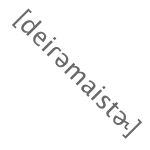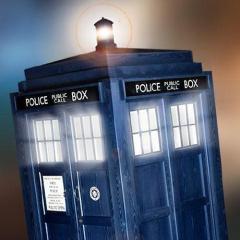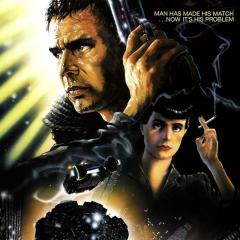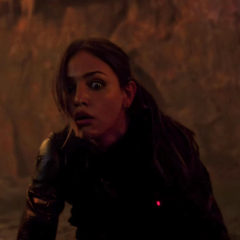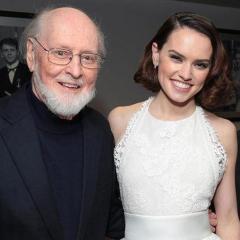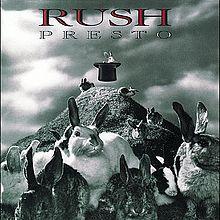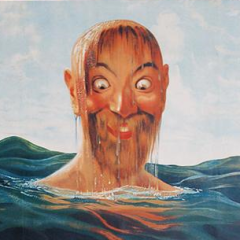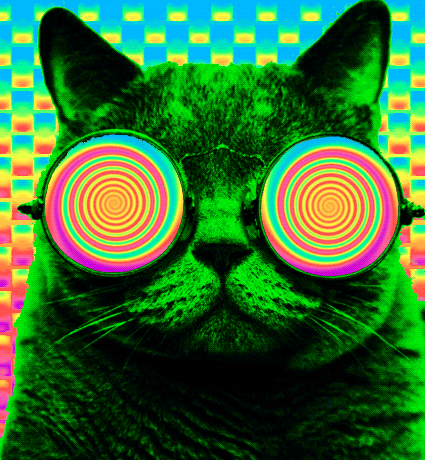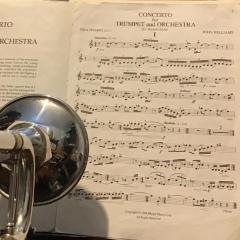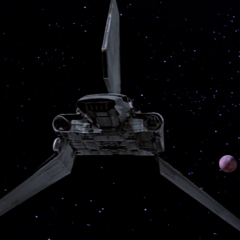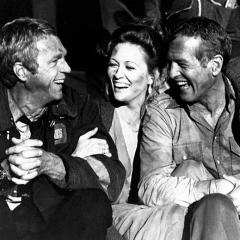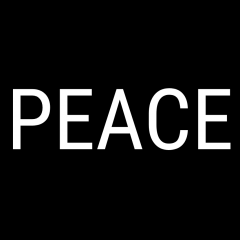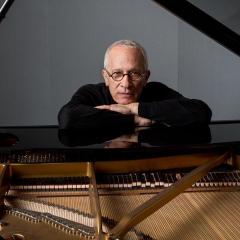-
Posts
12,519 -
Joined
-
Last visited
-
Days Won
9
Reputation Activity
-
 Datameister got a reaction from enderdrag64 in Harry Potter 7CD Collection - MUSIC discussion
Datameister got a reaction from enderdrag64 in Harry Potter 7CD Collection - MUSIC discussion
It is weird, and I like it. My assumption has always been that they wanted the musical phrase to last neatly for the whole shot of the band. If they'd cut the film the exact same way but not edited the music, it would have been a little awkward in the cut to Han.
-
 Datameister got a reaction from enderdrag64 in Harry Potter 7CD Collection - MUSIC discussion
Datameister got a reaction from enderdrag64 in Harry Potter 7CD Collection - MUSIC discussion
Ah, I getcha. That's probably a big part of it. Part of me still expects Cantina Band #2 to have that conspicuous edit in its main melody.
-
 Datameister got a reaction from bollemanneke in Harry Potter 7CD Collection - MUSIC discussion
Datameister got a reaction from bollemanneke in Harry Potter 7CD Collection - MUSIC discussion
Ah, I getcha. That's probably a big part of it. Part of me still expects Cantina Band #2 to have that conspicuous edit in its main melody.
-

-
 Datameister got a reaction from JTN in John Williams and his trumpets
Datameister got a reaction from JTN in John Williams and his trumpets
The rest of the brass don't actively detract from my enjoyment. But there are definitely broader differences between Williams's London and LA recordings. I've never been inside a scoring stage—more's the pity—but I get the impression that Sony does have a drier sound than Abbey Road or AIR Lyndhurst. The PT and the Potter scores have very noticeable (but natural-sounding) reverb tails that I assume are partly artificial and partly from the room. Recent Williams scores don't sound close-miked to my amateur ear, but the sound certainly seems to decay more quickly.
This holds true for all the instruments, and it holds pretty true for scores like E.T. and Jurassic Park—scores in which the trumpets still sound great to me, albeit different from their British counterparts.
-
 Datameister got a reaction from JTN in John Williams and his trumpets
Datameister got a reaction from JTN in John Williams and his trumpets
There has been a shift in the way trumpets sound in Williams scores. The difference is both subtle and impossible to ignore, and unfortunately, it's a change for the worse. I would like your help in figuring out what has changed.
(This is where I give the disclaimers that this is all entirely subjective, that I have the utmost respect for professional trumpeters on both sides of the pond, and that there are non-Williams scores with similar trumpet issues.)
The change became really noticeable with KOTCS, and it's stuck around in his (LA) recordings ever since. It's most noticable in loud passages for multiple trumpets, perhaps playing triads or octaves. There is a quality to the sound that is somehow both grating and underwhelming—aggravating yet anemic.
Here are some examples of JW scores in which the trumpets do NOT have this problem:
E.T. Temple of Doom Hook Jurassic Park The Lost World
I have no complaints whatsoever about the trumpets in these scores, all of which were recorded at the Sony Scoring Stage with LA studio musicians. The sound is bright, clear, and modern, but not unduly fatiguing.
As the new millennium hit, Williams recorded six scores in London: three SW prequels and three Potters. These too feature glorious trumpets, recorded mostly at Abbey Road and mostly with LSO players.
Williams's next film was KOTCS. Suddenly, the trumpets took on a different sound: dull but strident, claustrophobic but distant, weak but distracting. It's hard to put into words. To be clear, these performances and recordings are still by professionals, but something definitely shifted.
Unfortunately, this wasn't a one-off. Tintin, the SW sequels, the Adventures of Han … they all have the same problem. But we've also been treated to a few more London recordings—Galaxy's Edge, for instance, and Powell's adaptations for Solo. And what do you know? These sound great.
I've become increasingly preoccupied with trying to figure out what's different on a technical level. Here are some possible factors that have occurred to me:
Choice of recording venue Choice of mics Placement of mics Mixing choices Tape vs. digital Use of artificial reverb Preference for Bb trumpets in London and C trumpets in LA Choice of specific trumpet manufacturers/models Shifts in performer technique/style Shifts in compositional style
But I don't see how any of these alone could account for the change.
What do you think? It's understandably hard to find truly detailed information on a lot of these recordings, so despite all my listening and searching and pondering, I haven't been able to come up with an answer.
-
 Datameister got a reaction from Faleel in The Orchestral Sample Library Thread
Datameister got a reaction from Faleel in The Orchestral Sample Library Thread
I'll plug for Reaper if you're just doing personal projects. Practically free and very capable.
-
 Datameister got a reaction from MrJosh in John Williams and his trumpets
Datameister got a reaction from MrJosh in John Williams and his trumpets
There has been a shift in the way trumpets sound in Williams scores. The difference is both subtle and impossible to ignore, and unfortunately, it's a change for the worse. I would like your help in figuring out what has changed.
(This is where I give the disclaimers that this is all entirely subjective, that I have the utmost respect for professional trumpeters on both sides of the pond, and that there are non-Williams scores with similar trumpet issues.)
The change became really noticeable with KOTCS, and it's stuck around in his (LA) recordings ever since. It's most noticable in loud passages for multiple trumpets, perhaps playing triads or octaves. There is a quality to the sound that is somehow both grating and underwhelming—aggravating yet anemic.
Here are some examples of JW scores in which the trumpets do NOT have this problem:
E.T. Temple of Doom Hook Jurassic Park The Lost World
I have no complaints whatsoever about the trumpets in these scores, all of which were recorded at the Sony Scoring Stage with LA studio musicians. The sound is bright, clear, and modern, but not unduly fatiguing.
As the new millennium hit, Williams recorded six scores in London: three SW prequels and three Potters. These too feature glorious trumpets, recorded mostly at Abbey Road and mostly with LSO players.
Williams's next film was KOTCS. Suddenly, the trumpets took on a different sound: dull but strident, claustrophobic but distant, weak but distracting. It's hard to put into words. To be clear, these performances and recordings are still by professionals, but something definitely shifted.
Unfortunately, this wasn't a one-off. Tintin, the SW sequels, the Adventures of Han … they all have the same problem. But we've also been treated to a few more London recordings—Galaxy's Edge, for instance, and Powell's adaptations for Solo. And what do you know? These sound great.
I've become increasingly preoccupied with trying to figure out what's different on a technical level. Here are some possible factors that have occurred to me:
Choice of recording venue Choice of mics Placement of mics Mixing choices Tape vs. digital Use of artificial reverb Preference for Bb trumpets in London and C trumpets in LA Choice of specific trumpet manufacturers/models Shifts in performer technique/style Shifts in compositional style
But I don't see how any of these alone could account for the change.
What do you think? It's understandably hard to find truly detailed information on a lot of these recordings, so despite all my listening and searching and pondering, I haven't been able to come up with an answer.
-
 Datameister got a reaction from Naïve Old Fart in A perfect moment in “The Departure” from ‘E.T.’
Datameister got a reaction from Naïve Old Fart in A perfect moment in “The Departure” from ‘E.T.’
And sarcasm, right? Because I'm sure @Naïve Old Fart knows that "Adventures on Earth" is a published Signature Edition score for study and performance, while the singular "Adventure on Earth" is the OST track title. And that one is rendered inferior by the presence of the brass sweetener at 12:40.
EDIT: Beat me there, @blondheim.
-
 Datameister got a reaction from Holko in A perfect moment in “The Departure” from ‘E.T.’
Datameister got a reaction from Holko in A perfect moment in “The Departure” from ‘E.T.’
Your brain is lying to you
-
 Datameister got a reaction from bollemanneke in Harry Potter and the Sorcerer's (Philosopher's) Stone
Datameister got a reaction from bollemanneke in Harry Potter and the Sorcerer's (Philosopher's) Stone
This is cracking me up, seeing everyone finally expressing the same love for this score that I've felt since it came out. I feel so...ahead of the curve...
-
 Datameister reacted to Ludwig in A perfect moment in “The Departure” from ‘E.T.’
Datameister reacted to Ludwig in A perfect moment in “The Departure” from ‘E.T.’
I think when we feel that Williams reaches a kind of perfection with a scene or theme, then it always seems to be a great example of his talent for aligning many musical parameters toward similar or compatible sorts of expressions. In other words, it is the melody's aching leaps and steps, it is the gorgeous harmony, it is the warm scoring, the sturdy bass pedal point, the simple major scale, the yearning countermelody, and so on. It would be hard enough to come up with a great solution in just one of these parameters, but when they all coordinate? Perfection indeed!
This is golden-age Williams at his finest and it never ceases to boggle my mind how simple it sounds but how complex it can be to unpack.
-
 Datameister reacted to TownerFan in John Williams and his trumpets
Datameister reacted to TownerFan in John Williams and his trumpets
I think an overall argument can be made about a change in sound and performance in JW scores recorded in LA after 2005, imho. I have an upcoming podcast episode with a LA musician who addressed exactly this point and made some very interesting observations. It is my opinion that there is a golden two decades period performance-wise in JW scores recorded in LA that goes from early 1980s starting with E.T. and stops some how in 2002 with Catch Me If You Can. Mind you, there is nothing inherently bad in the scores recorded before and after that timeframe, but I believe that the orchestral performances heard in Hook, Far And Away, Jurassic Park for example represent the peak of the ensemble who was playing for JW at that moment. All the first chairs were at the top of their game and they were playing together also with many other composers as well, so they had a truly fantastic togetherness in terms of sound and style of playing. JW did a major overhaul in 2015 when he did The Force Awakens, as a lot of his historic principals retired, or were just not at his requested top-tier level anymore. Anyhow, there was the inherent issue of having a new generation of players who were now more used to record without vibrato, mostly doing striping (i.e. recording in separate sections) and without the same type of cohesiveness that JW always wants from the band. A lot of his preferred players nowadays come straight from the LA Phil or are at least musicians with strong classical backgrounds who also play a lot in local bands like the LA Chamber Orchestra, the Long Beach Symphony and the Pasadena Symphony.
Orchestral recordings for film scores in LA are now truly a fraction of what it used to be, therefore the level and the style of playing suffered some consequence. Again, this is not to say the quality of the playing of current LA musicians is subpar. Not at all. Some of them are just as great as their older colleagues: French Horn Dylan Hart is a genius, and flutist Heather Clarke did some incredible work on The BFG, just to mention a few. But I think the change that happened over the years is audible.
-
 Datameister reacted to karelm in John Williams and his trumpets
Datameister reacted to karelm in John Williams and his trumpets
So much of this comes down to the mix and how involved JW is in the final mix. For composers, attending a mix is quite painful as for each cue you listen to very bad mixes slowly getting tweaked. Generally, the mixer doesn't want any feedback until they're ready to show it to you because it's very much unfinished. For instance, they'll solo the trumpet mic which is guaranteed to sound awful as they tweak frequencies in that mic, then add the trumpet to a tree and tweak some more then move on to horns and to the same, then combine trumpet and horns with decca tree, etc., none of which is close to what it should sound like. This process is done for each instrumental group and when they are done, they'll ask for composer's comments. JW being a veteran already knows all this so I very seriously doubt he attends the mix and probably gets a finished mix to give feedback. In some cases, like Warhorse and Tintin, where both happened very close to each other, it's possible there was more delegation. Additionally, there are multiple mixers, and they don't have the exact same "sound". There is a clear and major sound difference between Eric Tomlinson (vintage LSO scores) and Shawn Murphy (prequel LSO scores). Additionally, technology and aesthetics change over time. 1980's used lots of reverb. Similarly, prequels had lots of reverb (to me, they used even more reverb). 2020's drier, more authentic acoustic recording is the style. Additionally, mixing consoles evolve/devolve. Let me explain. I'm a purist and absolutely adore the vintage 1970's vacuum tube mixing console sound of the NEVE preamps - these were used in Abbey Road. The problem is they're no longer made. Now, it's usually a chip that emulates the NEVE sound - EVEN ON THE NEVE gear! That means if you buy a contemporary NEVE preamp, it will be an emulation and to purists, have a different color than the vintage vacuum tube gear that went out of fashion. I can hear the difference in sound even though it's the same product because the tech is no longer the same. This is true for each and every component. A pro recording engineer I worked with used this analogy which I like. He brings his own vintage gear to record orchestras because the microphone membrane is more sensitive to vibrations than the exact same mic if it's new. The analogy he used was of a baseball glove that is very stiff when new but over time, the leather softens and relaxes and moves much more easily. This is the same with the microphone vibrating membrane that captures sound. So, a 1960's era Neumann mic could be superior to a 2022 modern era version of the very same mic. All these factors play a role in making it sound, well different. I think a really great test is to hear the vintage recording in a remaster and how great it sounds (compare Jaws original OST to the intrada 2CD, same with E.T. and Close Encounters. Note that Jaws, E.T., Close Encounters were recorded at Fox Newmann scoring stage with most of the same players. Horner's Avatar was recorded at the same stage in 2009. Of course, mostly different players and sound engineer plus mixer. I know some of Kingdom of the Crystal Skull was also recorded at UCLA Royce Hall - a concert hall that I happen to like the acoustics of. There are so many variables at play.
-
 Datameister got a reaction from crumbs in John Williams and his trumpets
Datameister got a reaction from crumbs in John Williams and his trumpets
There has been a shift in the way trumpets sound in Williams scores. The difference is both subtle and impossible to ignore, and unfortunately, it's a change for the worse. I would like your help in figuring out what has changed.
(This is where I give the disclaimers that this is all entirely subjective, that I have the utmost respect for professional trumpeters on both sides of the pond, and that there are non-Williams scores with similar trumpet issues.)
The change became really noticeable with KOTCS, and it's stuck around in his (LA) recordings ever since. It's most noticable in loud passages for multiple trumpets, perhaps playing triads or octaves. There is a quality to the sound that is somehow both grating and underwhelming—aggravating yet anemic.
Here are some examples of JW scores in which the trumpets do NOT have this problem:
E.T. Temple of Doom Hook Jurassic Park The Lost World
I have no complaints whatsoever about the trumpets in these scores, all of which were recorded at the Sony Scoring Stage with LA studio musicians. The sound is bright, clear, and modern, but not unduly fatiguing.
As the new millennium hit, Williams recorded six scores in London: three SW prequels and three Potters. These too feature glorious trumpets, recorded mostly at Abbey Road and mostly with LSO players.
Williams's next film was KOTCS. Suddenly, the trumpets took on a different sound: dull but strident, claustrophobic but distant, weak but distracting. It's hard to put into words. To be clear, these performances and recordings are still by professionals, but something definitely shifted.
Unfortunately, this wasn't a one-off. Tintin, the SW sequels, the Adventures of Han … they all have the same problem. But we've also been treated to a few more London recordings—Galaxy's Edge, for instance, and Powell's adaptations for Solo. And what do you know? These sound great.
I've become increasingly preoccupied with trying to figure out what's different on a technical level. Here are some possible factors that have occurred to me:
Choice of recording venue Choice of mics Placement of mics Mixing choices Tape vs. digital Use of artificial reverb Preference for Bb trumpets in London and C trumpets in LA Choice of specific trumpet manufacturers/models Shifts in performer technique/style Shifts in compositional style
But I don't see how any of these alone could account for the change.
What do you think? It's understandably hard to find truly detailed information on a lot of these recordings, so despite all my listening and searching and pondering, I haven't been able to come up with an answer.
-
 Datameister got a reaction from ricsim88 in John Williams and his trumpets
Datameister got a reaction from ricsim88 in John Williams and his trumpets
I so hesitate to jump to age as a factor, but I can't deny that it's a possibility.
Interesting Jon Lewis quote I just found:
Source: https://www.vanlaartrumpets.nl/en/?vanlaar_artist=jon-lewis-3
Jon played on most of the scores in question, making his way up to principal. Wouldn't it be funny if my problem largely came down to a single custom-built instrument? I doubt that's the case, but maybe it's a factor.
-
 Datameister got a reaction from crumbs in John Williams and his trumpets
Datameister got a reaction from crumbs in John Williams and his trumpets
The rest of the brass don't actively detract from my enjoyment. But there are definitely broader differences between Williams's London and LA recordings. I've never been inside a scoring stage—more's the pity—but I get the impression that Sony does have a drier sound than Abbey Road or AIR Lyndhurst. The PT and the Potter scores have very noticeable (but natural-sounding) reverb tails that I assume are partly artificial and partly from the room. Recent Williams scores don't sound close-miked to my amateur ear, but the sound certainly seems to decay more quickly.
This holds true for all the instruments, and it holds pretty true for scores like E.T. and Jurassic Park—scores in which the trumpets still sound great to me, albeit different from their British counterparts.
-
 Datameister got a reaction from Tydirium in The Non-Episode Star Wars Music Poll
Datameister got a reaction from Tydirium in The Non-Episode Star Wars Music Poll
Galaxy's Edge for me, with Adventures of Han in second, followed by Obi-Wan. That's what my gut says, though I like all three.
I can't help wondering if Adventures of Han might have taken first if the suite had been recorded in at Abbey Road with the score proper. I've become increasingly preoccupied with figuring out why I don't like the sound of Williams's recent LA recordings, especially the trumpets. The musicians are obviously world-class; it must have something to do with the acoustics of the Sony Scoring Stage, the mics, the mixing, maybe even the use of C trumpets instead of Bb. Comparing Adventures of Han to the rest of the score or to Galaxy's Edge makes the difference really stark.
-
 Datameister got a reaction from MikeH in John Williams and his trumpets
Datameister got a reaction from MikeH in John Williams and his trumpets
There has been a shift in the way trumpets sound in Williams scores. The difference is both subtle and impossible to ignore, and unfortunately, it's a change for the worse. I would like your help in figuring out what has changed.
(This is where I give the disclaimers that this is all entirely subjective, that I have the utmost respect for professional trumpeters on both sides of the pond, and that there are non-Williams scores with similar trumpet issues.)
The change became really noticeable with KOTCS, and it's stuck around in his (LA) recordings ever since. It's most noticable in loud passages for multiple trumpets, perhaps playing triads or octaves. There is a quality to the sound that is somehow both grating and underwhelming—aggravating yet anemic.
Here are some examples of JW scores in which the trumpets do NOT have this problem:
E.T. Temple of Doom Hook Jurassic Park The Lost World
I have no complaints whatsoever about the trumpets in these scores, all of which were recorded at the Sony Scoring Stage with LA studio musicians. The sound is bright, clear, and modern, but not unduly fatiguing.
As the new millennium hit, Williams recorded six scores in London: three SW prequels and three Potters. These too feature glorious trumpets, recorded mostly at Abbey Road and mostly with LSO players.
Williams's next film was KOTCS. Suddenly, the trumpets took on a different sound: dull but strident, claustrophobic but distant, weak but distracting. It's hard to put into words. To be clear, these performances and recordings are still by professionals, but something definitely shifted.
Unfortunately, this wasn't a one-off. Tintin, the SW sequels, the Adventures of Han … they all have the same problem. But we've also been treated to a few more London recordings—Galaxy's Edge, for instance, and Powell's adaptations for Solo. And what do you know? These sound great.
I've become increasingly preoccupied with trying to figure out what's different on a technical level. Here are some possible factors that have occurred to me:
Choice of recording venue Choice of mics Placement of mics Mixing choices Tape vs. digital Use of artificial reverb Preference for Bb trumpets in London and C trumpets in LA Choice of specific trumpet manufacturers/models Shifts in performer technique/style Shifts in compositional style
But I don't see how any of these alone could account for the change.
What do you think? It's understandably hard to find truly detailed information on a lot of these recordings, so despite all my listening and searching and pondering, I haven't been able to come up with an answer.
-
 Datameister got a reaction from Bofur01 in The Non-Episode Star Wars Music Poll
Datameister got a reaction from Bofur01 in The Non-Episode Star Wars Music Poll
Galaxy's Edge for me, with Adventures of Han in second, followed by Obi-Wan. That's what my gut says, though I like all three.
I can't help wondering if Adventures of Han might have taken first if the suite had been recorded in at Abbey Road with the score proper. I've become increasingly preoccupied with figuring out why I don't like the sound of Williams's recent LA recordings, especially the trumpets. The musicians are obviously world-class; it must have something to do with the acoustics of the Sony Scoring Stage, the mics, the mixing, maybe even the use of C trumpets instead of Bb. Comparing Adventures of Han to the rest of the score or to Galaxy's Edge makes the difference really stark.
-
 Datameister got a reaction from Tydirium in John Williams and his trumpets
Datameister got a reaction from Tydirium in John Williams and his trumpets
There has been a shift in the way trumpets sound in Williams scores. The difference is both subtle and impossible to ignore, and unfortunately, it's a change for the worse. I would like your help in figuring out what has changed.
(This is where I give the disclaimers that this is all entirely subjective, that I have the utmost respect for professional trumpeters on both sides of the pond, and that there are non-Williams scores with similar trumpet issues.)
The change became really noticeable with KOTCS, and it's stuck around in his (LA) recordings ever since. It's most noticable in loud passages for multiple trumpets, perhaps playing triads or octaves. There is a quality to the sound that is somehow both grating and underwhelming—aggravating yet anemic.
Here are some examples of JW scores in which the trumpets do NOT have this problem:
E.T. Temple of Doom Hook Jurassic Park The Lost World
I have no complaints whatsoever about the trumpets in these scores, all of which were recorded at the Sony Scoring Stage with LA studio musicians. The sound is bright, clear, and modern, but not unduly fatiguing.
As the new millennium hit, Williams recorded six scores in London: three SW prequels and three Potters. These too feature glorious trumpets, recorded mostly at Abbey Road and mostly with LSO players.
Williams's next film was KOTCS. Suddenly, the trumpets took on a different sound: dull but strident, claustrophobic but distant, weak but distracting. It's hard to put into words. To be clear, these performances and recordings are still by professionals, but something definitely shifted.
Unfortunately, this wasn't a one-off. Tintin, the SW sequels, the Adventures of Han … they all have the same problem. But we've also been treated to a few more London recordings—Galaxy's Edge, for instance, and Powell's adaptations for Solo. And what do you know? These sound great.
I've become increasingly preoccupied with trying to figure out what's different on a technical level. Here are some possible factors that have occurred to me:
Choice of recording venue Choice of mics Placement of mics Mixing choices Tape vs. digital Use of artificial reverb Preference for Bb trumpets in London and C trumpets in LA Choice of specific trumpet manufacturers/models Shifts in performer technique/style Shifts in compositional style
But I don't see how any of these alone could account for the change.
What do you think? It's understandably hard to find truly detailed information on a lot of these recordings, so despite all my listening and searching and pondering, I haven't been able to come up with an answer.
-
 Datameister got a reaction from ragoz350 in The Non-Episode Star Wars Music Poll
Datameister got a reaction from ragoz350 in The Non-Episode Star Wars Music Poll
Galaxy's Edge for me, with Adventures of Han in second, followed by Obi-Wan. That's what my gut says, though I like all three.
I can't help wondering if Adventures of Han might have taken first if the suite had been recorded in at Abbey Road with the score proper. I've become increasingly preoccupied with figuring out why I don't like the sound of Williams's recent LA recordings, especially the trumpets. The musicians are obviously world-class; it must have something to do with the acoustics of the Sony Scoring Stage, the mics, the mixing, maybe even the use of C trumpets instead of Bb. Comparing Adventures of Han to the rest of the score or to Galaxy's Edge makes the difference really stark.
-
 Datameister got a reaction from Edmilson in The Non-Episode Star Wars Music Poll
Datameister got a reaction from Edmilson in The Non-Episode Star Wars Music Poll
Galaxy's Edge for me, with Adventures of Han in second, followed by Obi-Wan. That's what my gut says, though I like all three.
I can't help wondering if Adventures of Han might have taken first if the suite had been recorded in at Abbey Road with the score proper. I've become increasingly preoccupied with figuring out why I don't like the sound of Williams's recent LA recordings, especially the trumpets. The musicians are obviously world-class; it must have something to do with the acoustics of the Sony Scoring Stage, the mics, the mixing, maybe even the use of C trumpets instead of Bb. Comparing Adventures of Han to the rest of the score or to Galaxy's Edge makes the difference really stark.
-
 Datameister got a reaction from crumbs in The Non-Episode Star Wars Music Poll
Datameister got a reaction from crumbs in The Non-Episode Star Wars Music Poll
The earliest Williams score I really notice this on is KOTCS. There's something about the trumpets' tonal quality that is somehow both underwhelming and grating for me. Can't figure out why. I think I'm going to start a separate thread on it; I've been meaning to do so.
-
 Datameister got a reaction from oierem in Is John Williams in a way a role model for you and your own life?
Datameister got a reaction from oierem in Is John Williams in a way a role model for you and your own life?
I'm always hesitant to consider someone a role model if I don't know them personally. But based on my impressions of this man I've never met, I do have great respect for his humility, attention to detail, work ethic, etc. He also has a very strong focus on a single passion of his—a quality I envy, as I can't go more than a year or so without switching obsessions.


